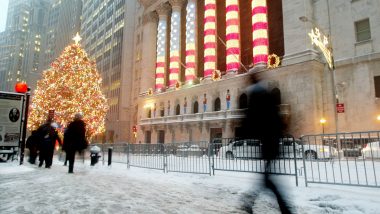Tokyo, December 18: Amid the Christmas festivities and the year's biggest shopping season, severe restrictions on trade between China and the rest of the countries have infuriated the retailers and shoppers in Europe and the United States.
During Germany's fist lockdown in March due to coronavirus, Oliver Hellmold, CEO of Notebooksbilliger, one of Europe's largest online electronics retailers, had started ordering a large number of gadgets from China like every year's pre-Christmas sales "anticipating a pandemic-related shift toward people working from home", said Nikkei Asia. Christmas 2020: Canada Expected to Register Over 5 Lakh COVID-19 Cases and 14,920 Deaths by Xmas Amid Ongoing Second Wave of Pandemic.
However, by October Hellmond's struggle to maintain inventory had begun. According to Hellmond, since August the demand from schools and the public sector for monitors, PCs and notebooks had increased by as much as 40 per cent year-on-year due to shifting of learning and services to online mode.
"We have lately on a daily basis been turning down orders of several hundred units for notebooks, PCs and monitors by schools and local governments," Hellmold said.
He, however, added that the private customers will have to "settle for alternative electronics models that are still available" for Christmas shopping. The situation is similar in the US as the stock levels in the country are historically low. However, the problem is not simply the result of an increase in demand.
According to Nikkei Asia, the upsurge has coincided with severe disruption to global logistics chains, with containers in short supply and airfreight struggling to keep up.
"It's the first time ever we are seeing such a complete nightmare, with retailers underestimating peak season demand and ports like Rotterdam being highly congested due to the pandemic reducing numbers of truckers and port workers," said Philip Damas, head of supply chain advisers at UK-based maritime consultancy Drewry.
As per the data by Sea-Intelligence, a global supply chain analysis company, reliability of the global ocean carrier is at "an all-time low". It further highlighted that the carrier reliability in October 2020 was only 52.4 per cent while in June 2019 it was 83.5 per cent.
Nikkei Asia quoted Drewry as stating that Asia-Europe container shipping traffic in November was down to 84 per cent of January's levels, despite exports from China to the EU growing 8.6 per cent year-on-year in November, thus boosting the costs for East-West sea shipping and airfreight to 174 per cent and 172.1 per cent of the levels in January.
Highlighting the problems leading to the "dwindling US stocks", Sanne Manders, COO at Flexport, a logistics company headquartered in San Francisco, was quoted as saying, "One is that you get a lot of backlog of freight that still needs to be cleared away...Second is low inventory levels because people basically empty all the warehouses by buying."
According to Lothar Thoma, managing director air and sea at Gebrueder Weiss, an Austria-based logistics company having 19 branches in China, the "mess started in February, when China closed its ports during the COVID-19 lockdowns, thoroughly upsetting global circulation of shipping containers".
While China's conditions in industrial and logistics sectors stabilised in the second quarter of the year leading to the rebound of its exports, the coronavirus lockdowns in Europe and the US impacted the European and American ports' logistics leading to the amount of time a container spends on land to double. In Germany, the time was now two weeks instead of one.
"Exacerbating this, shipowners saw that prices grew faster on the China-U.S. routes than the China-Europe routes, so they withdrew capacity from the latter to make more money on the former, which makes even more sense when considering that the China-U.S. route is about 10 days shorter," Thoma said.
He added, "Meanwhile, air cargo capacity has been down, too, due to the pandemic-related discontinuation of many passenger flights, which in normal times carry about 70 per cent of overall air cargo capacity. And China-Europe rail cargo is running into bottlenecks at the border between Belarus and Poland, where containers have to be loaded from one train to another, owing to Russian track gauge meeting Continental track gauge there."
Due to the capacity shortages on sea, Mattias Magnor, chief operating officer for road and rail of Germany-based Hellmann Worldwide Logistics, opined that there has been a demand for the "new Silk Road" trains.
He affirmed that the increase in demand started in the second quarter of 2020 with large quantities of personal protective equipment (PPE) were transported from China to Europe.
"We take it that the current levels will be kept until at least the Chinese New Year holiday in mid-February, when the Chinese factories will be closing," he added.
Meanwhile, Nils Seebach, a German e-commerce expert and founder of digital consultancy Etribes, blamed both European retailers and Chinese manufacturers for this situation.
He said that the "main mistake was the underestimation of the growth of online retail" in soaring of total retail in Germany to 30 per cent in comparison to pre-COVID-19 pandemic 15 per cent.
"They had based their calculations on the assumption of mild graduated growth of the online share, so many of the Chinese goods ordered for Christmas went to the wrong channel: brick-and-mortar retail," he said, ading that it is now not possible to simply get those goods quickly into online retail, as they would have to be packaged individually.
Meanwhile, Satish Jindel, president of ShipMatrix, a Pennsylvania-based shipment technology provider, opined that the retailers can only help in getting business out of the current situation.
"They could help with the situation by giving offers earlier in the season and alerting the consumers that if you order after the 15th, you are gonna either not get it on time or you are gonna have to pay for express shipping," he added.
(The above story is verified and authored by ANI staff, ANI is South Asia's leading multimedia news agency with over 100 bureaus in India, South Asia and across the globe. ANI brings the latest news on Politics and Current Affairs in India & around the World, Sports, Health, Fitness, Entertainment, & News. The views appearing in the above post do not reflect the opinions of LatestLY)













 Quickly
Quickly


